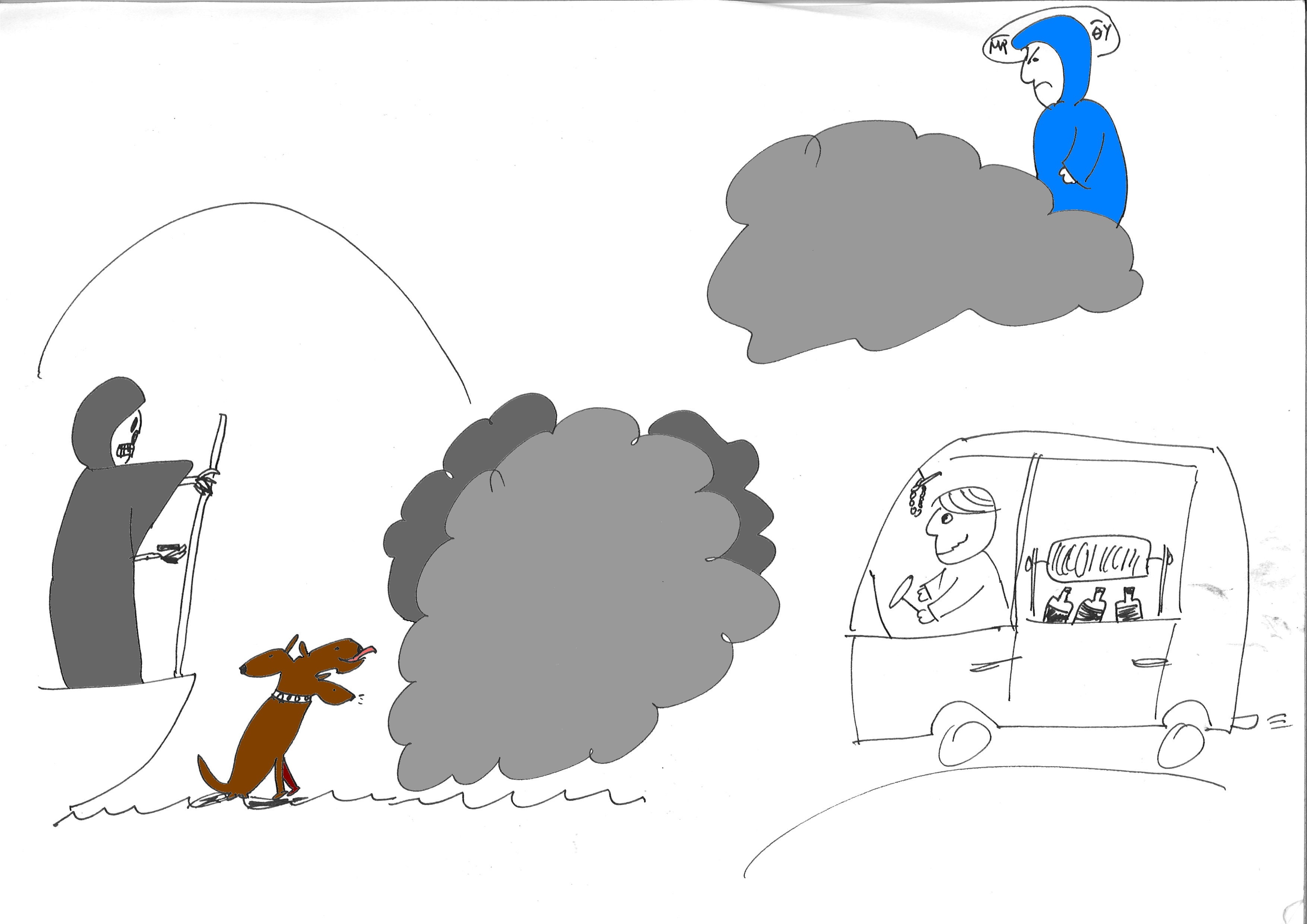Category: Uncategorized
Dimitra drives to the Acheron
The Acheron river was reputed in antiquity to be the gateway to Hades.
Dimitra Triantafyllidou’s answer to Are there any Greek towns built along the Acheron river in Greece? recounted driving through the drained Acherusian lake, and getting lost in the middle of the night, after a village festival.
https://www.quora.com/Are-there-…
On the 15th of August, Feast Day of the Dormition, commemorating the ascent of the Blessed Virgin Mary to the Heavens,
you and yours were tipsily driving through fog and darkness, INTO THE VERY GATES OF HADES?!
Why, yes, I do think I have visual of the occasion…
What would have world lost (apart from some more password combinations) if it had not used capital letters?
Not a whole lot. Consider:
- Only very few scripts even have a case distinction: Roman, Greek, Cyrillic, Armenian. Georgian and Cherokee are picking up case now, but that’s not because they need to, that’s because they’re being culturally influenced from hegemonic scripts.
- Languages vary wildly in what they choose to capitalise. German capitalises nouns; most languages don’t. Modern languages capitalise starts of sentences; mediaeval languages did not, and editions of Classical Latin and Greek, and Mediaeval Latin, do not. The only words consistently capitalised are proper names.
- It’s nice to single out proper names, since they can be confused out of context with common nouns; hieroglyphics used cartouches for that reason. But it’s not essential.
So, what would the world have lost? A little bit of ambiguity around proper names in European languages—which non-European languages have never found to be that much of a problem.
Of course, you would also have missed out on Studly caps and CamelCase. But human civilisation coped without them until the 1970s…
Which people have half Gothic half Slavic blood: Sorbians, others, or no one?
No idea whether the Sorbs are part-Gothic, or even how you could tell.
I have another, more obscure instance though.
Gothic survived in Gothia (Principality of Theodoro) in the Crimea, up until the 16th century.
Gothic shifted in the Crimea to Greek. In fact, the Gothic speakers that Ogier Ghiselin de Busbecq recorded were giving their Gothic nouns with Greek articles.
Of the Greeks of the Crimea, in turn, many shifted to speaking Crimean Tatar language. Their variant of Tatar is called Urum language (i.e. Rum, Roman—that is, Greek).
The Greek Orthodox population of Crimea, who called themselves Rumei in Greek and Urum in Tatar, were resettled in 1778 to the area around Mariupol in the Ukraine: the Greek-speakers in the surrounding countryside, the Tatar-speakers in the town. Mariupol is (just) under Ukrainian control, and borders the Russian separatist areas.
Greek and Urum are both under language shift to Russian (this is eastern Ukraine). And one would expect that they are intermarrying with ethnic Russians.
And, one would think, there would be some Crimean Gothic blood in that ethnic group of Greek/Urum speakers originally from the Crimea.
So… yes. There’s a likely “Other”.
Are there any Greek towns built along the Acheron river in Greece?
I don’t know the answer, but I do know how to read Greek Wikipedia: Αχέρων – Βικιπαίδεια
The Acheron was considered a river of Hades in antiquity. Which makes sense, given that Epirus, where it is located, was nowheresville to the Ancient Greeks. This also exaggerated their sense of its importance: far from being the second greatest river in the world, as Plato claimed in Phaedo (and the greatest was Oceanus itself), the Acheron is only 58 km long.
The Acherusian lake, which the Acheron flowed into, seems to have been associated with much of the spooky stuff by the Ancients, including the gates of Hades. The lake was drained in the 1960s, by the British concern Boots Ltd, and that has changed the flow of the river.
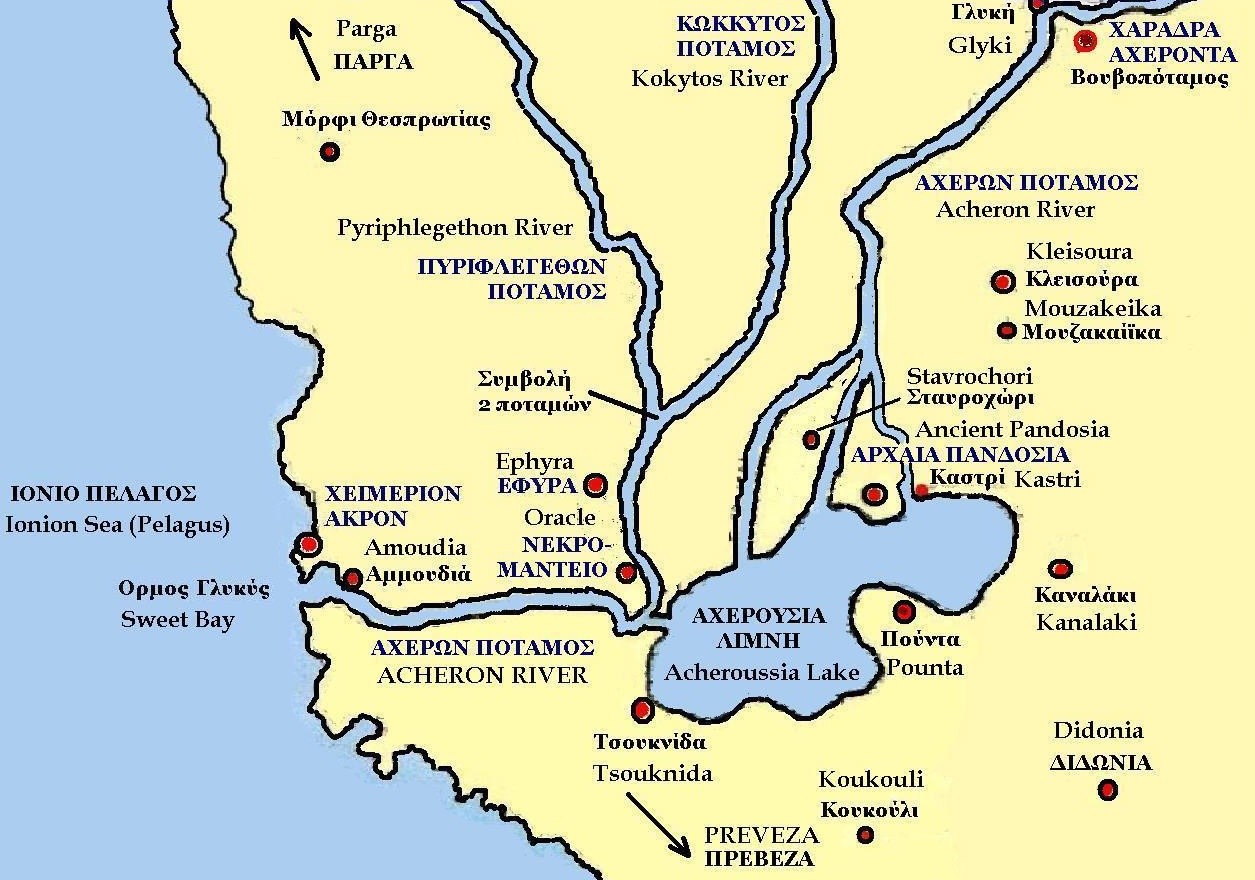
The Acheron in Antiquity
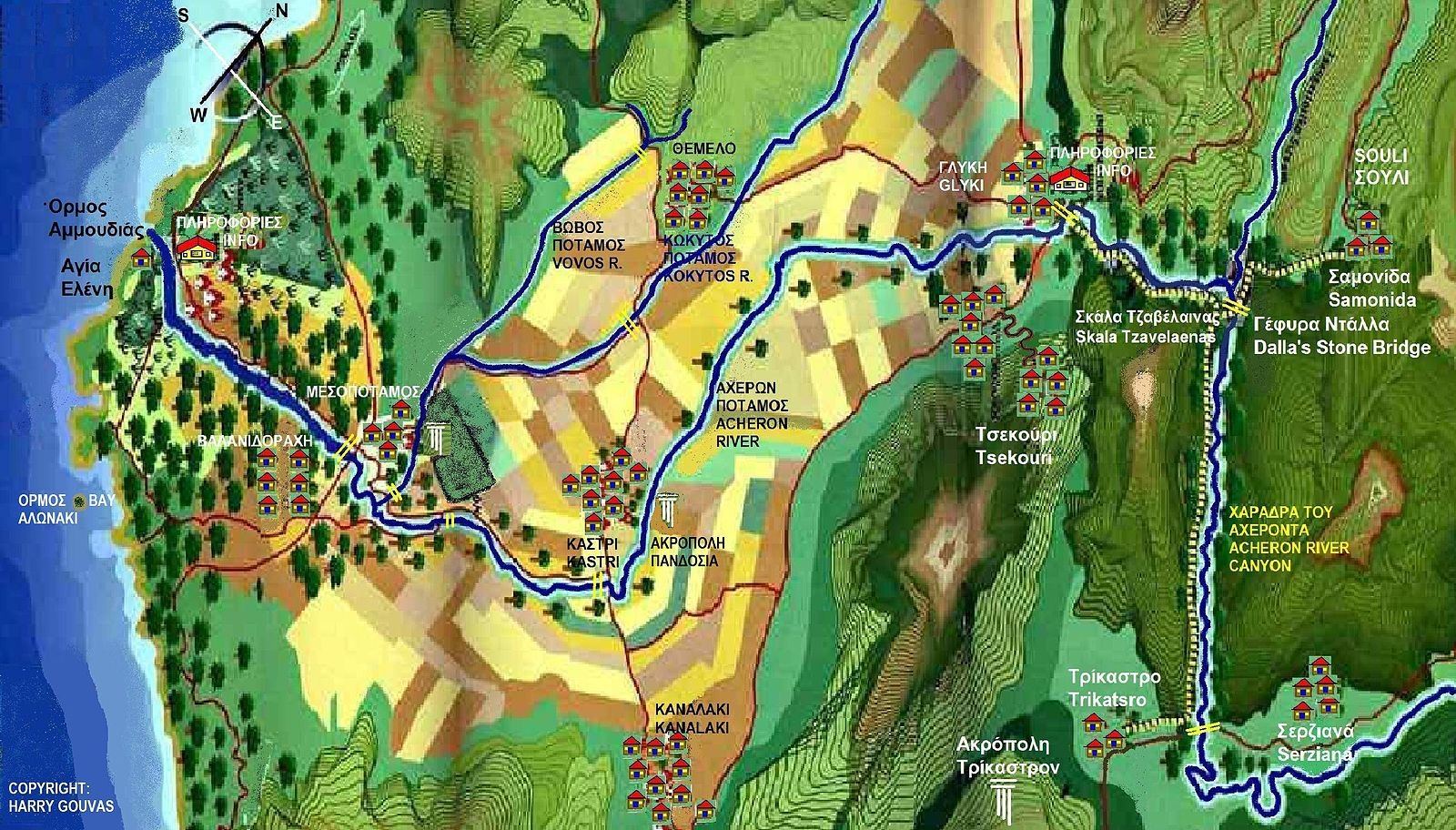
The Acheron now
Haralambos Gouvas, the local who drew the map above, thinks it’s pointless to try to correlate the Homeric geography of the Acheron with its modern geography.
From what I can tell, there are just small villages along the flow of the river. Ammoudia, Preveza (formerly Splantza), at the mouth of the Acheron, has a population of 330. Glyki (Γλυκή Θεσπρωτίας) has a population of 434; Kastri, Thesprotia has 760; Valanidorachi (Βαλανιδόραχη Πρέβεζας) has 334.
The only ancient towns there of note seems to have been Cichyrus/Ephyra and Pandosia (Epirus).
If Quomrade D’Angelo were to run for President of the United States as head of the Quommunist party, would you vote for him in 2020?
What, civil liberties in the US have not been curtailed enough already? BNBR shall be the template for expressing civic dissent? Quora bots should take over as the nation’s police force AND judiciary? Quora product management is the template for American ingenuity? Six years of venture capital in, Quora finances are the template for American economic recovery?
That… sounds a lot like Qommunism.
Quora is a good space. Quora management is not good management. If Quomrade DiCaprio nominates, I’d react about the same way (from my safe Australian vantage point) as I react now to Citizen Trump nominating.
Nick, proud member of the Disloyal Opposition.
cc Scott Welch. Who is also safe in Canada.
EDIT: I do believe I have some visual from the rally:
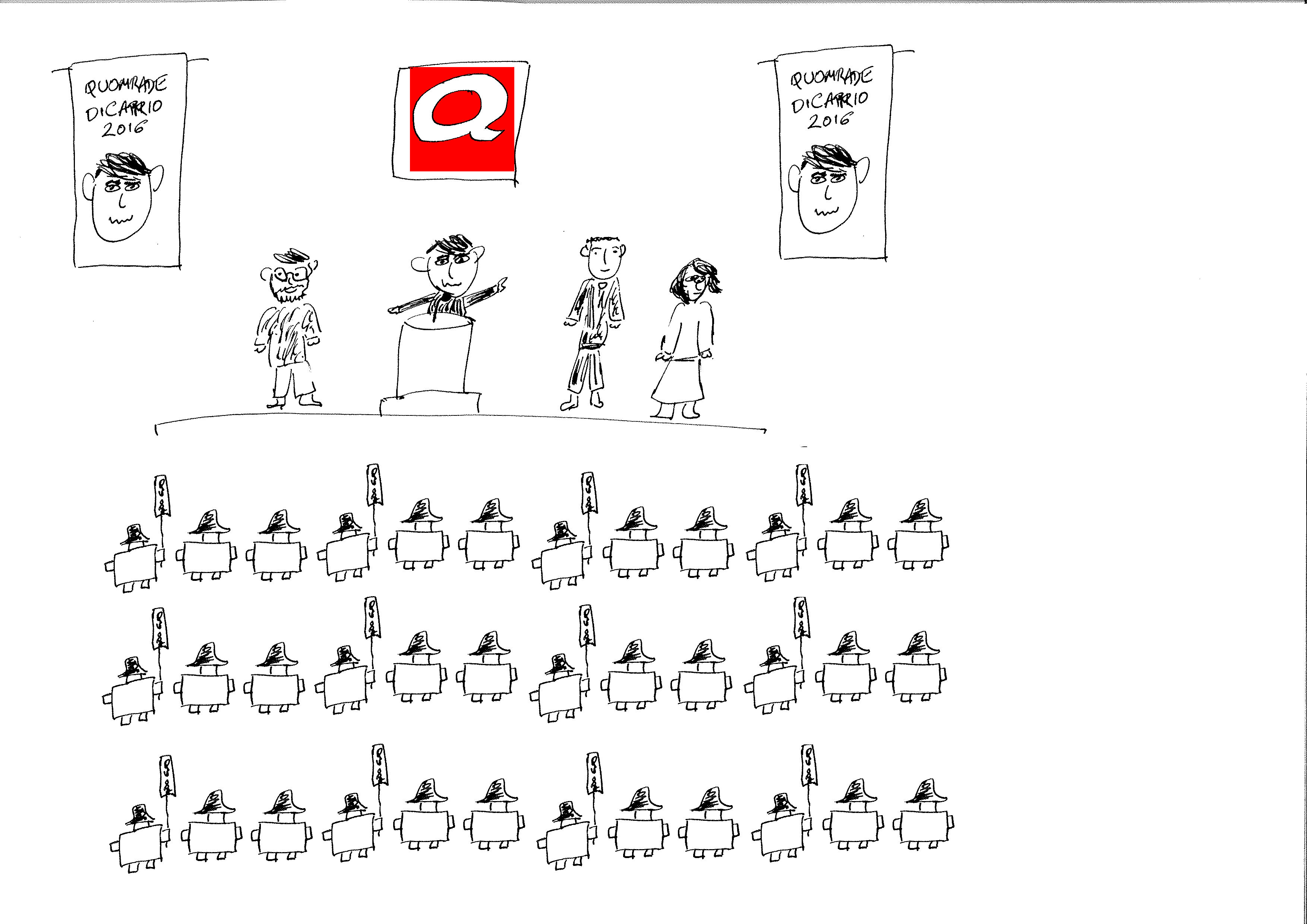
Is Nick Nicholas or another Quoran, the perfect Greek and English bilingual?
You know, folks, I fancy myself a fairly arrogant SOB. I bristle when called Mr instead of Dr. I ego-surf. My wife says my wedding was a Nick party, with some whassaname chick in the background.
And I thank you both for the unsolicited testimonial. The answer though is no.
I am unusually fluent for a diasporan of the second generation, because I lived in Greece as a child and I have studied the language and literature. But as Greeks I have chatted to can attest (I’m looking at you, Dimitra Triantafyllidou), I have gaps in my vocabulary, and I do think in English. In fact, I remember the switch in my thinking language, after we moved back to Australia.
A longstanding regret I had was that I lack the confidence and cultural fluency to tell a funny story in Greek. It was a proud moment during my honeymoon, when I got drunk enough to tell my relatives the story of how Tamar and I got together.
Meanwhile, the linguistic and cultural fluency in English of my fellow Quorans in Greece is an ongoing source of delight.
Is there a group of elite users controlling Quora?
Trusted Reporting (Quora feature)
Moderation at Scale: Distributing Power to More People by Marc Bodnick on The Quora Blog
Who are the Trusted Reporters on Quora?
People with a strong track record of frequent and accurate reporting will be treated by the system as trusted reporters. When trusted report is made, it will be prioritized for even faster review by Quora, and may even be collapsed or limited in distribution immediately. Since we review all reports, answers that were immediately collapsed will be checked after the fact.
Who the trusted reporters are is not clear, as with most things on Quora, but it is a far smaller group than Top Writers, and it was initially populated by former community admins.
This does not mean that the Trusted Reporters are able to use moderation to their own malicious ends; after all, all they get to do is report, and actioning the reports is still the job of, at different times, the inhouse Quora moderators, some outsourced shmuck in Bangalore, or some robotic version of Punxsutawney Phil. But as of January last year at least, there is an elite among power users when it comes to reporting.
EDIT: Well, the immediate collapsing bit is a kind of power; but it is putatively temporary.
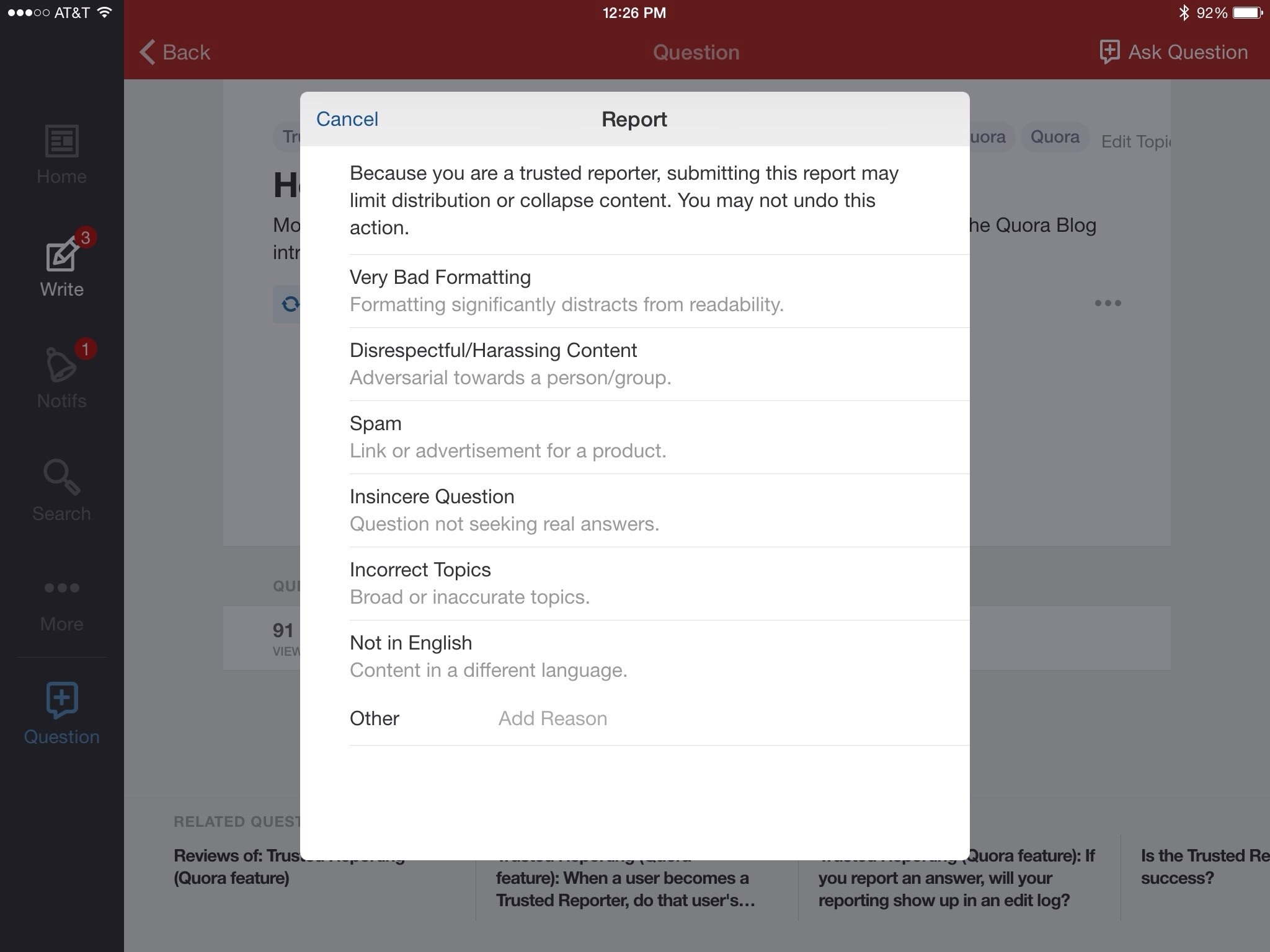
From Garrick Saito’s answer to How do you tell if you are a trusted reporter?
Some linguists say there are 91 English spelling rules and some say there are none. Who is right?
Agreed with Brian (more or less). Despite the inconsistencies and hypercorrections and weirdness, English spelling is not random. If you see a new word, you have reasonable chance of coming up with a consistent pronunciation; and if you hear a new word, you have a (somewhat less) reasonable chance of coming up with a consistent spelling.
Language is a complex system. The rules aren’t as ironclad as the rules of mathematics (what real-world system’s rules are?) But what happens in language is not random either. There are known trends and tendencies in language, and rules can be formulated to account for them. It’s just that the outcomes are not fully predictable.
Spelling in English is an even more complex system than language, because it is more fragile, and subject to a wider range of pressures. Individual errors or wilfulness can have much more of an impact, deliberate antiquarianism can have much more of a say, and spelling gets stuck at a particular historical point more readily. But it’s still not random. It’s just far less predictable.
That does not mean you give up. It means you work harder, and give up and shrug only when you have to.
English spelling is maddening, and the more you learn about the history behind it, the madder you get. My latest exasperation: heaven could have ended up a long initial vowel (from the nominative hēven) or a short initial vowel (from the oblique hĕvenes). We pronounce it with a short vowel, and we spell it with a long vowel. Argh!
But I cannot accept that English spelling is boring. English spelling can teach us a lot.
Including how not to come up with a spelling system…
What do the Turkish loanwords merak and meraklı mean in your language?
In Greek, μεράκι means:
- yearning
- love-sickness
- pride in one’s work (in the phrase με μεράκι “with merak”)
A μερακλής on the other hand is a bon vivant, a connoisseur, someone who knows how to have a good time and who appreciates the finer things in life.
And the verb μερακλώνομαι is to be in a euphoric mood, usually associated with drinking.
I’ll now defer to the definitions of the Triantafyllidis dictionary:
meraki:
- Intense desire: I have a ~ to go to Paris. If a child has no ~ for studying, don’t force him.
- Intense love and care for something, especially an activity: Old time craftspeople worked with ~, not robotically like modern builders.
- (plural) Intense pleasant sensation that comes from entertainment (cf. kefi): Tonight he drank a bit more and came to ~.
meraklis:
- Someone characterised by meraki, intense love or care for something. A ~ cook/barber/tailor/cabinetmaker. He is a ~ about his work; he doesn’t do anything shoddily. Retsina and meze fit for ~’s.
meraklono:
- To be overcome by a very intense pleasant feeling: He was ~-ed by the song and started dancing.
- To cause meraki in someone. The drink ~-ed him and he started singing.
- (passive) To have an intense desire for something: He ~-ed for a sweet/for a trip.
BTW, I’m OP, and I am going to formulate a grand unified theory of how the meanings grew when the answers come in.
